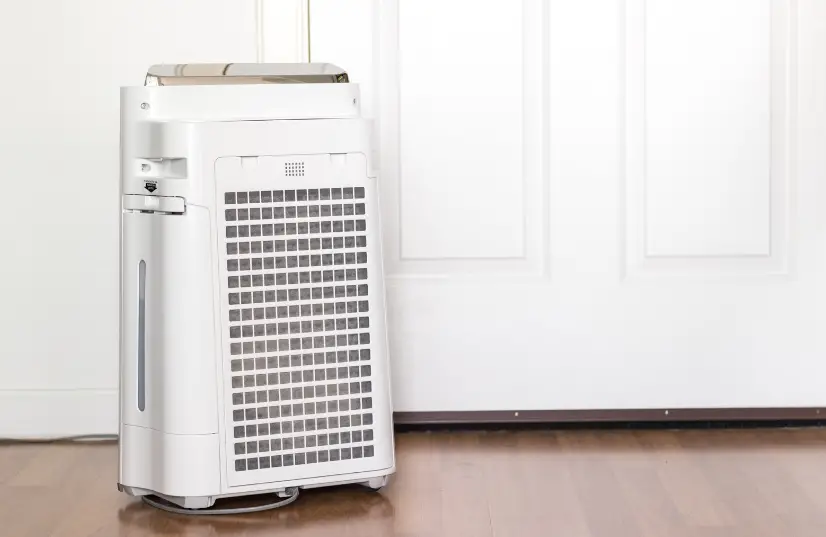
Whether at home or in the office, an air purifier can help clean the air from pollution but do air purifiers dry out the air? Are they worth buying and using without any consequence to the air you breathe? Will they cause health problems? Let’s find out in this guide.
We care about your indoor air a lot – which is why we want to clear out some misconceptions about air purifiers. Dry air is a widespread problem in most parts of the world, which can lead to health issues such as allergies and asthma.
That’s why we want to help you get informed about whether or not air purifiers can dry out the air. We put together facts about how air purifiers work.
Does an air purifier make your throat dry?
No, air purifiers do not make your throat dry. That’s because air purifiers are designed only to clean your indoor air from pollutants such as dust, smoke, pet dander, cooking odor, and the like. The humidity levels won’t change when you run your air purifier because it doesn’t attract water molecules.
These water molecules are what maintain the humidity in a room. Since an air purifier is only designed to clean the air using its HEPA filter (for dust and smoke) and activated carbon filter (for cooking odors and VOCs), it won’t bother your humidity levels and will not make your air (and throat) dry.
This is why we highly recommend running an air purifier together with a humidifier, as well as an aromatherapy diffuser to help soothe your senses. The air purifier only takes out pollutants but humidity is another topic altogether.
If you do feel that the air purifier makes you feel like the air is too dry – it’s only an illusion due to running the air purifier at a faster fan speed. Air purifiers aren’t blowing electric fans as they suck up dirt instead of blowing it into your face. Try running the air purifier at a slower speed, in this case.
Is there a downside to air purifiers?
Certainly not – there are even benefits of sleeping with an air purifier aside from its general benefits. For instance, an air purifier can:
- Clean the room from dust, smoke, and other pollutants
- Relieve your room from bad smells such as kitchen odors
- Help lessen symptoms of allergies and asthma
- Make your room feel fresh for guests
- Help you sleep better with its low-noise operation
- Get rid of pet dander and pollen
- Protect babies from most respiratory problems
The only potential downside is if you bought an air purifier with ozone – which is not the case with most units nowadays. Too much ozone levels are dangerous to humans, which is why governing bodies, such as the FDA, screen different air purifiers to make sure they are less than 0.05 ppm.
With that said, most air purifiers nowadays are compliant to make sure they don’t emit harmful amounts of ozone, so air purifiers are safe for us all.
Do air purifiers help stuffy rooms?
Yes, air purifiers can help freshen any stuffy room. The common cause of a stuffy room is polluted air and poor ventilation, which is why an air purifier with the right filters can help relieve bad smells in any room that has poor air quality.
If your room smells like body odor, it may be a sign that you need to use an air purifier, as well as clean up the room (declutter objects you don’t need) and ventilate (open the windows) a little. If you don’t have windows, try opening the doors from time to time and/or using an electric fan.
The combination of ventilation and air purifier will help get rid of dust so that it doesn’t settle around your room. It also helps to reduce the number of horizontal surfaces in your room to avoid dust accumulating. And also – don’t forget to launder those curtains and bed sheets!
During the winter season, however, we recommend avoiding opening windows too much since cold air can enter your room and potentially make the indoor air dry. In this case, you’ll need a humidifier to run alongside your air purifier to keep the moisture in the air.
Air purifiers can also run at different speeds depending on the model. Usually, higher fan speeds are suitable for very stuffy rooms. If you need to keep a room smelling fresh while away, you might wonder: should I leave my air purifier on when I’m not home? The answer is yes!
Are air purifiers healthy for you?
Certainly! Air purifiers are healthy for anyone since they do the job of cleaning any indoor space if they have the proper filters and if they’re used the right way. With that said, here are some tips on how you can maximize your air purifier usage to improve your health:
Run them all day long
There are many benefits to running an air purifier all day long. For instance, if you run it constantly, it will continuously filter the air so that when you get back home from school or work, you’ll breathe fresh air. Furthermore, the air purifier won’t work so hard if the dust is managed constantly.
If your air purifier needed to be switched to full speed, it could cause the motor to wear out faster. This is why running it all day at a slow speed will help save its motor lifespan, as well as give you peace of mind when you come back home.
Run them at night and set timers
Setting your air purifier timer at night can help you feel fresh when you wake up. Most people tend to have a stuffy nose and can’t sleep properly at night – and it could be due to a polluted room. An air purifier cleaning the room at night can help solve that problem.
Replace the filter(s) as needed
A dirty air purifier filter will only spew back the pollution it absorbed from your room air. This is why you should always check and replace the filter(s) when needed. HEPA filters usually take 6 to 12 months before they need to be completely replaced.
On the other hand, most activated carbon filters can be replaced every 1 to 2 years. However, it’s best to actually look at the manual or ask the manufacturer about it. Fortunately, most units in the market nowadays have a filter change indicator light that glows when it’s time to change the filter(s).
Place the air purifier strategically
You might be wondering: where should I place my air purifier? Any spot in the room that isn’t in a corner is already a good choice. Consider areas near windows and keep the air purifier off the ground (if it is a desk type). You may also want to put it near the kitchen if mold smells are your biggest concern.
Another way to place your air purifier to make it more effective is opposite your room (outside the door). In this way, you can block bad smells and pollution from entering the room – especially when it comes to kitchen or laundry smells.
FAQs
Can I run an air purifier with a humidifier safely?
Absolutely! Air purifiers and humidifiers can help reduce dry air in the room, as well as keep it fresh and clean. A humidifier’s job is separate from that of an air purifier since a humidifier only adds moisture (water molecules) to the room. On the other hand, air purifiers take out dust and other pollutants.
Do air purifiers relieve asthma and allergies?
Yes – air purifiers are meant to relieve allergies, as well as asthma, by reducing particles from the air, such as pollen, dust, and smoke. Dry air, which causes allergies, is not caused by air purifiers but rather, by lack of humidity. You can use a humidifier to help keep moisture in the room.
How do I maintain humidity with a humidifier alongside an air purifier?
Consider running your air purifier in a well-ventilated room alongside a humidifier, which should be set to at least 40 to 55% to keep your indoor air feeling comfortable. You could also have an air quality monitor to precisely measure if your indoor air is too dry or not.
Why does it still feel like the air is dry when I run my air purifier?
It’s just an effect of the fan speed. If you set your air purifier to the highest fan speed (similar to how you would use an electric fan or an air conditioner), it will make you feel as if the air is getting too dry. However, it’s not really the case as air purifiers aren’t electric fans, but are air-cleaning devices.
Conclusion
To wrap it up: do air purifiers dry out the air? Not really – there’s little impact of running an air purifier on your current humidity. What you need is a humidifier if you feel like the air is too dry or stuffy. We hope that this guide helped clear up facts about air purifiers (and hopefully, clear your nose, too!).



